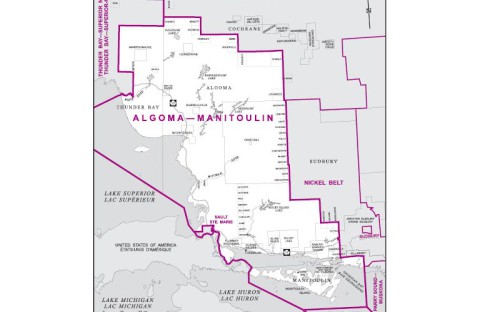by Alicia McCutcheon
LAKE HURON—After travelling to port towns throughout the upper Great Lakes last year, including Kagawong, the International Upper Great Lakes Study Board released its final report without much good news for Lake Huron.
According to the report, the study board was created to examine “how to manage fluctuating lake levels in the face of uncertainty over future water supplies to the basin while seeking to balance the needs of those interests served by the system” and was comprised of members from both Canadian and US federal governments, provincial and state governments, universities and the public.
When it came to the study of Lakes Huron and Michigan, the board chose to focus, at the direction of the International Joint Commission on, “the feasibility and implications of raising water levels by means of restoration structures in the St. Clair River to compensate for past natural and human-induced changes,” the report states.
As reported previously in The Expositor, restoration structures included sills and underwater hydroelectric turbines that would come at a cost of between $30 and 70 million and upset the natural spawning grounds of the endangered lake sturgeon. It would also take upwards of 20 years for such a commitment to take place. The findings state that while restoration would increase water levels at low points in the lake, it would also mean raising the levels to an “extreme high” in southern ports.
“Commercial navigation and recreational boating and tourism interests would benefit, while coastal zone interests, hydroelectric generation and indigenous peoples would be adversely affected,” the report continues.
The report continues in the same vein, noting that while wetlands and navigation traffic are hurting, doing anything to remedy that situation would mean putting those at the southern, more densely populated parts of the lake at risk for flooding (in the case of Lake Michigan, this would include the city of Chicago). The report also noted that views of the people of Lakes Huron and Michigan on water level issues varied depending on the geographical location. Again, no clear recommendations.
Adaptive management was recognized by the study board as “having an important role to play” through six initiatives: strengthening hydroclimatic monitoring and modeling; ongoing risk assessment; ensuring more comprehensive information management and outreach; improving tools and processes for decision makers to evaluate their actions; establishing a collaborative regional adaptive management study for addressing water levels extremes; and promoting the integration of water quality and quantity modeling and activities.
In previous reports, adaptive management also meant municipalities were expected to take on more of a role, such as moving marinas to areas with more water, or the diking of wetlands—none of which were deemed realistic by Island municipal officials, members of the Manitoulin Area Stewardship Council (MASC) or Sierra Club Ontario.
Mary Muter of Sierra Club Ontario pointed to the report’s finding of a 5.8 percent increase in the outflow from Lake Huron into the St. Clair River. “That’s six billion gallons a day,” she put the figure into perspective. “That’s a huge amount of water.”
Ms. Muter accused the study board of cleverly manipulating the numbers, using metric figures for the people of the US, who may not readily understand the conversion.
“‘Adaptive management’ is clever wording meaning downloading services to municipalities,” she slammed the report.
In a previous report, the study board raised fear for southern communities, putting forth exaggerated numbers as to how much water levels would raise, Ms. Muter said, noting that when Sierra Club Ontario called the US chair out on this, the numbers were recalled, but a statement was never officially made. “The impacts downstream are actually minimal, but it was too late. The damage was done.”
Both Ms. Muter and Therese Trainor, member of MASC and the MASC water committee, applauded the International Joint Commission’s (IJC) recent regulation plan to restore Lake Ontario’s water levels.
Last month the IJC announced the changes to the 1958 regulations that are expected to allow wetlands to again flourish. “Water levels may peak higher than usual and also draw lower than normal, but the overall effect should be minimal for recreational and commercial boaters and owners of shoreline properties,” according to an article from The Brockville Recorder and Times.
“We support the new regulation plan for Lake Ontario and hope the commissioners can find a solution for the middle lakes that will allow their now stranded wetlands, due to sustained water levels, to begin to function again with natural fluctuations in water levels,” said John Jackson of Great Lakes United in a release.
“They did the right thing for Lake Ontario. Let’s do the right thing for Lakes Huron and Michigan,” Ms. Muter said.
“Good things happen when people get involved,” Ms. Trainor echoed, choosing to think positively of the report. “It means we can get a good plan for Lakes Huron and Michigan and it means the commissioners listened. I am disappointed in the sense that the report wasn’t more assertive. Nothing’s happening, so this just tells us we need to work harder.”
Dr. Pat Chow-Fraser, who has studied wetlands around Manitoulin for McMaster University, also reacted at the recent report. “We cannot allow these sustained low water levels to continue,” she said in a release. “The study did not provide the funding for the research to determine if and how the wetlands can adapt under these conditions. The proposal to create wetlands where they do not currently exist is naïve and wrong-headed (an adaptive management strategy) and ignores the fact that many fish return to the same wetlands to spawn year after year, and more importantly that the thousands of wetlands that currently exist in eastern and northern Georgian Bay have taken thousands of years to develop.”
“Attempts by humans to manipulate natural conditions often fail because of lack of understanding of the dynamics of ecosystems,” Dr. Chow-Fraser continued. “We cannot and should not support these unrealistic recommendations.”
Ms. Trainor noted that one of the recommendations is the formation of a levels advisory board to seek input, “which is good news. We will have a voice.”
“This is certainly something MASC would be involved in,” she added.
Ms. Trainor explained that MASC has thrown its support behind Georgian Bay Forever, a powerful organization with deep pockets, that is pushing for multi-lake regulation, which the report is not supporting, nor is Sierra Club Ontario.
“We applaud everyone out there that’s making a difference—it takes all kinds, as it were,” Ms. Trainor said. “You can’t please everyone, or agree on exactly the same thing. You can’t just ignore the numbers. One-hundred and twenty-seven billion gallons, you can’t just ignore that.”
Ms. Trainor said MASC is hoping the IJC will make the trip to Manitoulin this summer, as she has heard a trip is planned to Sault Ste. Marie in July. But regardless, she continued, a water event will be held.
“Hopefully we can move as fast as the water is going down and try and build up hope,” Ms. Trainor said.




